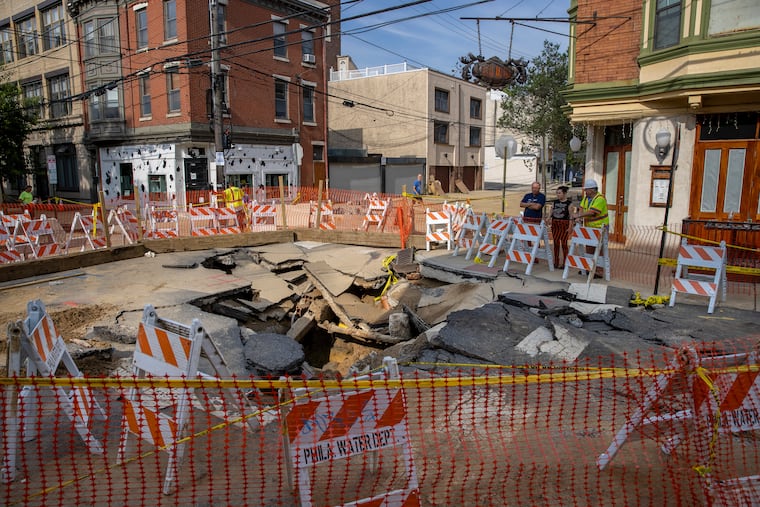Philadelphia water bills will go up Wednesday. Here’s why, and how it could have been worse.
Though the rates are rising, they’re still cheap compared to rates paid by suburban customers of Aqua Pennsylvania.

Philadelphia’s 496,000 water customers will see their monthly bills increase about 3.6% starting Wednesday, and by a larger amount a year from now.
The water, sewer and storm water bill for a typical residential customer using 500 cubic feet of water per month will increase from $66.73 to $69.15 on Wednesday. Those bills will increase $4.43 more to $73.58 on Sept. 1, 2022, for a total of 10.3% over two years.
It could be worse.
The city’s increased bills, as painful as those hikes may be, remain far below what many suburban customers pay. The city’s total bill would amount to about half the combined water and wastewater bill of a suburban residential customer of Aqua Pennsylvania.
The private Bryn Mawr water utility, a subsidiary of Essential Utilities Inc., recently asked state regulators to increase its bills by 17.9%, to about $155 a month for customers getting both water and sewer service. (By comparison, the city’s combined rate would reach $73.58 by 2022.) The Aqua rates are quoted for customers who use 4,000 gallons a month, or about 7% more than the metric the city uses.
» READ MORE: Aqua Pa., big buyer of town utilities, seeks to boost suburban water bills 17% — and sewer charges far more
“Water and sewer rates are rising within our region and across the nation as utilities are faced with maintaining and upgrading aging infrastructure,” Philadelphia Water Commissioner Randy E. Hayman said in a statement on Monday. “We only need to look at recent major water main breaks to see the importance of having a sustainable rate structure that allows us to make needed investments in our system.”
The Water Department, which had delayed its rate-increase request for a year because of the COVID-19 pandemic, asked the independent Water Rate Board in February to boost bills by 17.6% in two steps, to $78.45 a month. That initial request provoked pushback from City Council, whose members asked the board to reject it.
Philadelphia’s finance department then recalculated the annual amount the water department would contribute to the city’s pension plan, reducing it by $25 million a year. That savings allowed the water department to shrink its rate hike request.
The timing of the city’s recalculation seemed opportune, coming several weeks after Council members protested the water rate increase. But a city spokeswoman said the analysis of the allocation of city pension costs had been underway because of changing makeup of city employees before the water rate increase was announced.
“Because of that changing distribution of employees, we determined that it was appropriate to ask our actuary to analyze whether it made sense to change the allocation of pension costs among funds,” Joy Huertas, a city spokeswoman, said in an email.
Under a settlement negotiated between the city and consumer advocates, the rate increase approved in June by the Water Rate Board will generate $57 million more a year for the water department in 2022, compared with $141 million in the original request.
The agreement includes an unusual caveat: Next year’s rate increase may go down if customers secure more federal pandemic relief support than anticipated, or if the department’s financial reserves exceed certain levels. The Water Rate board will revisit the rate decision next year. Under no circumstances will next year’s rate increase be greater than the agreed amount.
“We are very very pleased not just to be able to significantly reduce the projected bill impacts on residential and small commercial customers in Philadelphia, but also to be able to reach an agreement with the city that creatively resolves a lot of the questions that were raised in the case,” said Robert W. Ballenger, the head of the Community Legal Services energy unit, which acts as a consumer advocate in water rate cases.
The Water Rate Board, which is chaired by retired Pennsylvania Consumer Advocate Irwin “Sonny” Popowsky, also approved an increase in the amount assessed on all water customers to pay for the city’s Tiered Assistance Program, a novel plan the city launched in 2017 to provide low-income customers with discounted bills linked to household income. The program also allows the city to forgive debts of customers who stay current with the bill payments.
The cost to a typical residential customer not participating in the low-income assistance program will increase 21 cents per month to 89 cents, or slightly more than 1% of a customer’s bill.
The city last increased water rates in 2018, when the water rate board allowed water bills to increase only about 1% over two years. The Water Department had requested an 11% increase over two years.
The water department also extended a coronavirus freeze on shutoffs for residential customers until April 22, a more generous policy than that which applies to state regulated utilities, which resumed service terminations in April of 2021.
Though residential water customers can’t be shut off until next year, the city did resume assessing penalties for overdue water bills on May 1, and on Aug. 2 began referring the unpaid balances of customers who are not in assistance programs to collection agencies.
The Philadelphia Inquirer is one of more than 20 news organizations producing Broke in Philly, a collaborative reporting project on solutions to poverty and the city’s push toward economic justice. See all of our reporting at brokeinphilly.org.